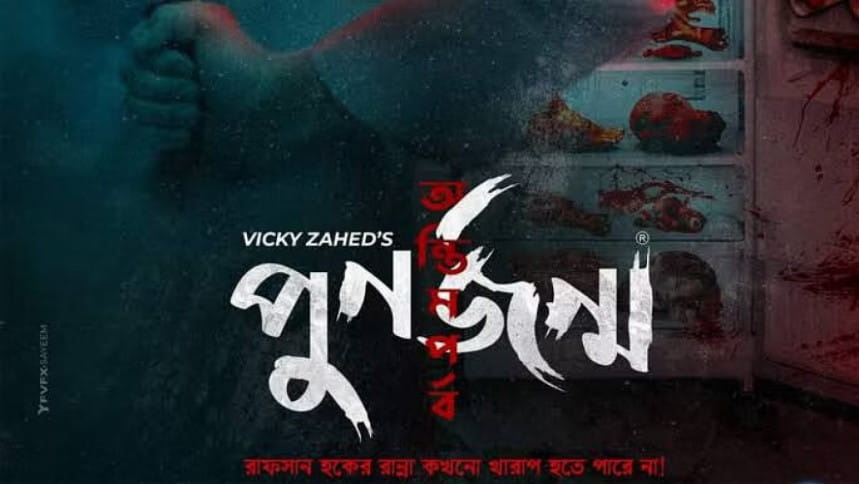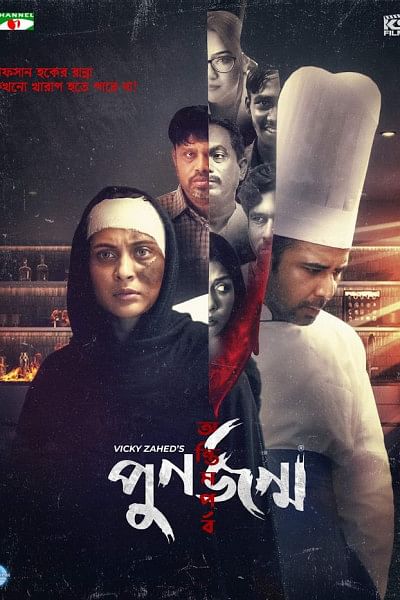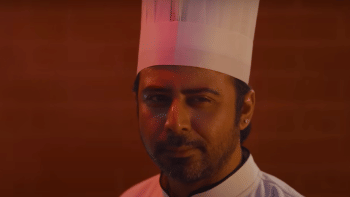‘Punorjonmo’: do untied ends make a bad thriller?

Celebrity chef Rafsan Haque's serving of cunning and cannibalism came to an end with the last instalment of the "Punorjonmo" universe; but it left behind a growing appetite for stories that are yet to be explored under the thriller genre of our local industry.
Psycho thrillers have become the new hype as they slowly seep into mainstream and OTT platforms with many veteran and emerging creators taking a particular interest in it. It's easy to fascinate viewers with such works via an unbridled show of violence; but the success of this genre lies in clever storytelling and character dimensions that add a sense of reality to the necessary dramatic undertones.
After ferociously killing, cooking, and serving his wife Neela at a wedding party in his hotel, our Hannibal Lecter chef Rafsan was relieved to have done away with all evidence for his almost perfect crime. Almost,until Neela turns up at a police station 3 long years later in "Punorjonmo 1".
The saga that continues for the next four shows including the spinoff "Shuklopokkho", which brings into light more characters integral to the climax. And the character dynamics is where the brilliance of the series lies, as the storytelling becomes quite rushed in the last two instalments.

"Shuklopokkho" introduces Kamal, a vicious cannibal and serial killer who later becomes an accomplice to the chef. Fuelling Rafsan's newly found hobby of cooking human meat by supplying his victims, Kamal turns into more of a devotee to him in the latter films.
Abdullah Al Sentu in this role is an absolute menace. Cliche as it might sound, he is one of those who can act out an entire scene or a particular emotion by simply using a glance, a stare, a turn of a head or a nonchalant shrug. His calm, almost affable interactions with his victims with the omnipresent manic look in his eyes is as unnerving as his complete devotion to Rafsan, the way he looks up to this monster with love.
Although humanising killers is a validly debatable notion when it comes to true crime content, fictional works of the genre come with fair potential for scrutinising the antagonists. Backstories for villains and anti heroes work well because some of those humanise them not for garnering empathy; but for rendering an insightful, more complex perception of human nature and its primal instincts.
Afran Nisho's acting expertise effortlessly carried Rafsan's wicked charm for the first two seasons of the series. However, the blatant simplicity of Rafsan's motive behind killing Neela partially curbed the credibility of his intense psychotic attitude in the latter films. From that angle, Kamal was the more well established bad guy from his debut in the spinoff.
Qazi Nawshaba as Rafsan's sister, Borsha felt underutilised throughout the series due to some unnecessarily prolonged subplots. Borsha, as someone who was close to Neela and almost figured out how she was murdered, could've been an intriguing sleuth amid a male heavy cast. But her presence went largely unnoticed.
Mehazabien Chowdhury is commendable in her double roles as Neela and Rokeya, but the amount of sub plots that led to a rushed ending for her, didn't quite make her last laugh as satisfying as it could've been.
Part of the charm of thrillers, especially one that has its own franchise, is about finding the balance between introducing curious subplots and properly concluding all of them in relation to the gist of the story.
"Punorjonmo" did hit it out of the park with the first part, but also left one too many loose strings that are not open ended conclusions. The series does set a benchmark for future works in the same genre, but sometimes less is more indeed.

 For all latest news, follow The Daily Star's Google News channel.
For all latest news, follow The Daily Star's Google News channel. 









Comments